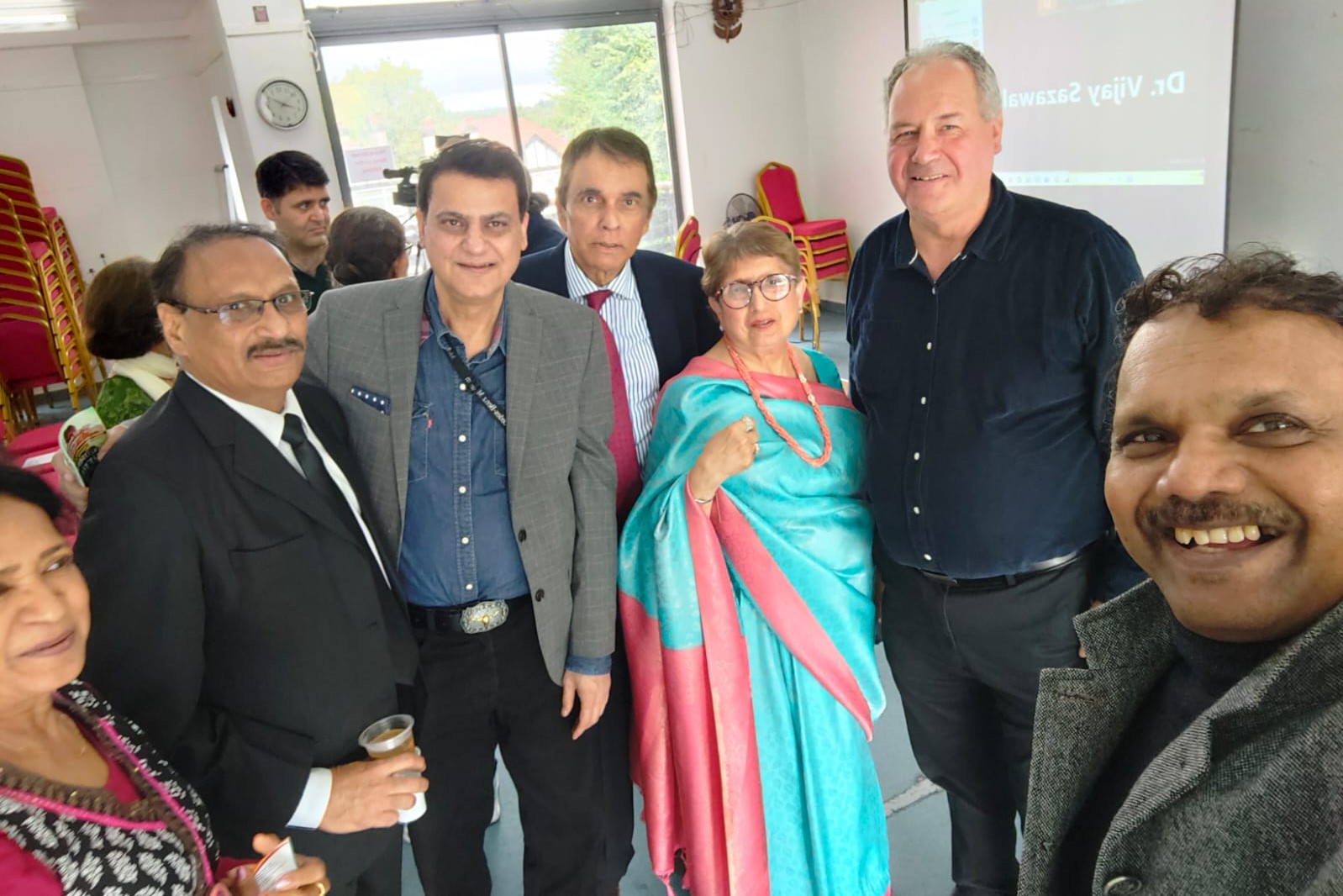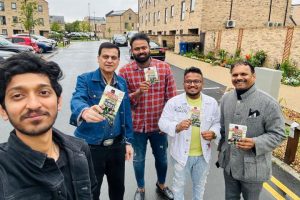

Dr Vivek Kaul (third from left) with British MP Bob Blackman (extreme right) and members of the Indian diaspora (Photo courtesy: Vivek Kaul)
London: Indians in London are eagerly awaiting the visits of Indian army veterans, Major General GD Bakshi and Lieutenant General KJS Dhillon – popularly known as Tiny Dhillon. The two decorated retired generals will talk about Indian heritage and the soft power of the Indian army.
India Narrative spoke with event organiser and a key member of the diaspora, Dr Vivek Kaul – surgeon and NHS doctor, about the event that takes place on August 13 in Harrow, North West London. He says that the two eminent military strategists, who are very different personalities, will talk about the dissimilar concepts shaping India in various ways.
While Gen. Bakshi speaks about the cultural continuity of the Indic civilisation and its future direction, Gen. Dhillon will speak on the multi-dimensional role of military leadership in civilian areas with a focus on Jammu and Kashmir (J&K), Kaul said. Gen. Dhillon is known for using the military’s soft power to curb militancy and improve people-army links in the sensitive state that borders Pakistan.
The idea behind the event is to spread awareness among the Indians. “We chose these two speakers as they are non-political and do not stand for an ism, political ideology or prism. The two generals are bi-partisan and Gen. Dhillon is known for winning the hearts and minds of people during his time in Kashmir”, says Kaul.


He added that Indians in the UK are a highly diverse group because of their backgrounds, therefore, it is important to organise interactions with people from India so that the diaspora understands the country better.
“The expats here are not just from India but also from Africa. A large population hails from East Africa, where they had spent upto 100 years and then came to the UK. Despite the change of continents and the passage of time, these people are still connected to their roots”.
Giving a deeper insight into the community, he says that the initial flood of Indians were the medical doctors who came to the UK in the fifties. “Many do not know that the British had organised chartered flights to bring Indian doctors here”.
The second wave of Indians who landed on British shores were the Indians who were expelled by Idi Amin, military dictator and president in 1972. As they were British subjects, tens of thousands chose to come to the UK while thousands decided to go back to India. Kaul says: “Leicester was the only council that invited the expelled Indians. These included both Hindus and Muslims”.
The latest category of British Indians arrived in the country thanks to the highly skilled migrant programme (HSMP), a point-based immigration system that allowed for successful and well-paying professionals to settle in the UK. Among this category, a diversified group of well-educated techies, engineers, chefs, designers and nurses migrated to the UK.
Kaul says that the HSMP Indians are younger and most connected to their roots. “They also changed the image of India because of their professionalism and education”, he adds.
With the Indians spreading out widely across the world, there have been calls from different sections to organise the expats into a more consolidated group. Kaul has been part of this global effort to bring the diaspora together and simultaneously create more awareness about India.
He has spent the last two months mobilising people and raising funds. In many residential areas in London Kaul has been going house-to-house with volunteers and distributing leaflets about the event.
He says: “For this event, where we expect more than 500 people to attend, we have raised micro-donations from the community. This has enabled us to generate more interest in the event and people get a sense of participation which is not there in a sponsored event”.
With the Indian diaspora on a high across the world, particularly the English-speaking nations, Kaul says that more Indian speakers and thought leaders will be visiting the UK, adding, “we want to widen the exposure among the diaspora about India as well as bring people from different ideologies”.
India's largest automobile in-plant railway siding at Maruti Suzuki's Manesar facility started operation on Tuesday,…
Google on Tuesday unveiled its Safety Charter for India's AI-led transformation, at the "Safer with…
The human rights organisation of the Baloch National Movement (BNM), Paank, has published its most…
The Israel Defence Forces (IDF) on Tuesday claimed that it has killed Iran's senior-most military…
Amid escalating conflict between Iran and Israel, the Ministry of External Affairs (MEA) on Tuesday…
Amid the escalating tensions between Israel and Iran, Indian Embassy in Iran has asked all…